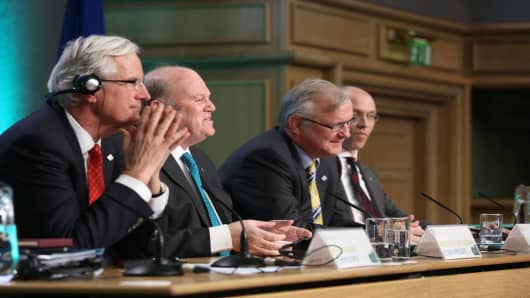Europe countries should ring-fence up to 10 percent of GDP for bank recapitalization, a Dutch academic told European finance ministers as they met in Dublin on Friday.
Dirk Schoenmaker, dean of the Duisenberg School of Finance, told ECOFIN ministers that European banks must recapitalize before work could begin on building a banking union, and that governments should allocate up to 10 percent of GDP towards capitalizing banks that are unable to do so via the credit markets.
(Read More: Europe Risks 'Endless Depression' in Pursuit of Austerity)
"The national government is the fiscal backstop, with a cap of 10 percent of that country's GDP (to avoid endangering the solvency of that country)," Schoenmaker said in his presentation in Ireland.
Speaking to CNBC, Schoenmaker said that undercapitalization of banks was an urgent problem across Europe, both in core and peripheral countries.
"We need to recapitalize now. The U.S. did it in 2009 and now U.S. banks are helping the U.S. recovery. We do not have recovery in Europe, so we badly need credit growth in the economy," Schoenmaker said.
(Read More: Cyprus Reaches End of a Long and Sleazy Road)
"If banks do not give credit to new projects than we will never get economic recovery. That is the message of Japan, where banks did not give credit for 10 years and there was a lost decade of growth. It will be a pity if Europe goes down the Japanese route. "
Schoenmaker added that half of European banks are currently in a "weak position".
"I looked at banks [across Europe] and half are well-capitalized and able to generate new loans and half are in a weak position, and are across Europe, including in France, Germany, the Netherlands... It is not a country thing," he said.
(Read More: In Effort to 'Rebalance,' Europe Sticks to Austerity)



